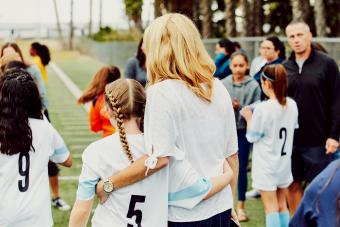
Exercise and energy go hand in hand. This gives many people the idea that an energy drink is a great way to enhance their workout or help pump their kids up for the big game.
However, unlike sports drinks that contain important electrolytes that the body needs to function properly, energy drinks contain caffeine and other stimulants. These will not only dehydrate a person, but they can also cause an array of other symptoms. For parents wondering if energy drinks for kids are a good idea, here are some facts that are good to know.
Quick Facts on Energy Drinks That Parents Should Know
- According to the Harvard School of Public Health:
- Adolescents can experience heightened effects from energy drinks due to their smaller body size.
- Energy drink consumption in youth populations has been linked to "risk-seeking behaviors, poor mental health, adverse cardiovascular effects, and metabolic, renal, or dental problems."
- Excessive caffeine consumption by a person of any age "can lead to anxiety, insomnia, heart problems like irregular heartbeat and elevated blood pressure, and in rare cases seizures or cardiac arrest."
- Guarana is a plant extract that is found in most energy drinks. It is a natural caffeine source and many companies do not list the milligram amount, which means that the amount of caffeine in an energy drink may be higher than what is reported on the can.
- Dehydration, anxiety, restlessness, insomnia, high blood pressure, irregular heartbeat, and even seizures in both kids and adults are some of the impacts of energy drinks when consumed on a regular basis.
- While there is relatively research on energy drinks and kids, in 2011, there were nearly 1,500 energy drink-related emergency room visits reported for teens ages 12 to 17.
Can Kids Have Energy Drinks?
According to the American Academy of Pediatrics (AAP), kids under the age of 12 should avoid caffeine consumption and teens ages 13 to 18 should limit their caffeine intake to 100 mg per day. They also advise that children consume less than 25 grams of sugar each day. Energy drinks typically contain high amounts of caffeine and sugar, so they are not the best option.
Most energy drinks contain 80 to 200+ mg of caffeine and 25 to 40 grams of sugar in a single can. This means that energy drinks are not an ideal product for kids or teens.
Caffeine & Sugar Content Comparison
Here is a quick comparison of the caffeine and sugar contents of a few of the top energy drinks and other caffeinated beverages available on store shelves.
| Caffeine Content | Sugar Content | |
| Can of Soda (12 oz) | 30 - 50 mg | 40 - 50 mg |
| Cup of Coffee (8 oz) | 80 - 100 mg | 0 mg* |
| Red Bull Energy Drink (8.4 oz) | 80 mg | 26 mg |
| Monster Energy Drink (16 oz) | 160 mg | 27 mg |
| Rockstar Energy Drink (16 oz) | 160 mg | 24 mg |
| PRIME Energy (12 oz) | 200 mg | 0 mg |
Looking at this chart, some teens and parents may be thinking that there are options that contain less caffeine and sugar than what the AAP recommends for the day. You might also be considering the fact that only drinking half a can of energy drink would give you the boost you need without exceeding the advised caffeine and sugar levels.
Along with the risks noted in the quick facts above, another problem is that even if you don't surpass these recommended limits, caffeine is addictive. Consuming energy drinks, or any other caffeine source, on a regular basis can cause caffeine dependence. This can cause you to feel less of an effect from that half a glass of the energy drink over time.
This, in turn, leads to the need for a greater amount of caffeine consumption to achieve the same energy boost and a higher risk of experiencing the side effects that high amounts of this stimulant can bring on. Avoiding caffeine until adulthood is a better option.
Is PRIME Energy Drink Good for Kids?

TikTok has taken the world by storm and PRIME Energy drinks can be seen all over this social space. Both kids and adults are promoting these beverages, and with no added sugar and 300 mg of electrolytes built into the beverage, it can seem like a good choice.
However, if you take the time to read the disclaimers on their website, they clearly note that these energy drinks are not for kids. In each product's description section, they state that it is "for ages 18+". This can also be seen on the cans themselves.
PRIME Hydration Is a Different Type of Product
Conversely, if you are considering PRIME Hydration drinks, these contain no caffeine, only 1 gram of sugar, antioxidants and electrolytes, and the first two ingredients are water and coconut water. This makes them an ideal choice for active kids and teens, on occasion.
Gatorade and Powerade are both common sports drinks that are used for hydration. While sugar can help you absorb electrolytes more efficiently, high sugar consumption is ill-advised for kids on a regular basis. Most sports drinks contain way more sugar than soda, making options like vitaminwater Zero and PRIME Hydration better choices, comparatively.
The American Academy of Pediatrics stresses to parents that while "pediatric athletes can benefit from using sports drinks that contain carbohydrates, protein, or electrolytes," sports drinks are unnecessary for "the average child engaged in routine physical activity" and that "stimulant-containing energy drinks have no place in the diets of children or adolescents."
Water is the most ideal way to keep your kids hydrated. Coconut water can also be a great alternative. If your kids are keen on the fun flavors, consider infusing these liquids with fresh fruits and herbs!
Energy Drinks
We all want to have a pep in our step and while energy drinks are a quick solution, they are not the best one. If your kids want to have ample energy, the best way to achieve this is to make sure that they get an ideal amount of sleep every night, eat a healthy diet filled with color and protein, and drink lots of water!
Exercise is another great solution! Many people don't know that when you exercise, your body releases endorphins, which actually serve as a natural energy source.
In other words, it's best to avoid energy drinks for kids and promote healthy habits instead. Parents themselves may even consider some of these facts and choose alternatives to drinking energy drinks regularly. Knowing the facts can help you make the choices that are right for you and your family.







